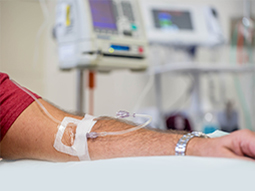
When you need a minor surgical or nonsurgical outpatient procedure, our outpatient anesthesia providers can keep you comfortable, helping you get in and get out on the same day.
Also known as ambulatory anesthesia, outpatient anesthesia is administered for minor procedures where an overnight stay is not anticipated. It may be given in a hospital, physician’s office, or surgery center, and can often be tailored to help minimize the length of your stay after surgery, getting you home faster.
Common procedures benefiting from ambulatory anesthesia may include:
- Colorectal surgery
- Gastroenterology
- General surgery
- Gynecology
- Ophthalmology
- Oral surgery
- Orthopedics
- Otolaryngology
- Urology
Our anesthesia providers
MedStar Health anesthesia teams work with experienced doctors and surgeons across our physician offices, hospitals, and multi-specialty care centers to minimize your length of stay after surgery. They limit the use of opioid medications when possible, using innovative pain management techniques to help:
- Decrease your length of stay
- Enhance rapid recovery
- Lower your costs
- Reduce side effects of anesthesia
What to expect
After arriving for your procedure, your anesthesiologist or CRNA will meet with you and your doctor in the preoperative area to discuss your anesthetic plan. We encourage you to ask questions so you feel calm and prepared going into your procedure.
Learn More About the Day of Procedure
Your anesthesia team will then use a personalized approach to manage your anesthetic, taking into consideration your age and medical condition(s). Depending on your procedure, your anesthesia team may use one or a combination of the following types of anesthesia:
- General anesthesia – Results in a loss of consciousness and sensation
- Moderate or deep sedation – An injection into a vein or muscle to reduce anxiety and decrease pain
- Regional anesthesia – An injection of local anesthetic provides numbness, loss of pain, or loss of sensation to a large area of the body. This type includes techniques such as spinal anesthesia, epidural anesthesia, and arm and leg nerve blocks
- Local – An injection under the skin that results in numbness to a small area of the body
Learn More About Types of Anesthesia
During the procedure, your anesthesia team will use state-of-the-art monitoring techniques to ensure your safety and comfort. After your procedure, you will be transferred to the Post-Anesthesia Care Unit (PACU), where specialized nurses will give you postoperative instructions to enhance your recovery.
Questions to ask your anesthesia team
Our team will help you understand safe and effective methods for minimizing your pain and helping you recover quickly and safely. To ease your mind as you prepare, you may want to ask your anesthesia providers the following questions:
- What kind of anesthesia will I have?
- How long will it take for the anesthesia to wear off?
- Am I at risk for any adverse effects to the anesthesia?
- Will I be able to drive home, or will I need help?
Our providers

Expert anesthesiology care
Getting the care you need starts with seeing one of our anesthesiologists.
Our locations
Distance from Change locationEnter your location
MedStar Franklin Square Medical Center
9000 Franklin Square Dr. Baltimore, MD 21237
MedStar Good Samaritan Hospital
5601 Loch Raven Blvd. Baltimore, MD 21239
MedStar Harbor Hospital
3001 S. Hanover St. Baltimore, MD 21225
MedStar Union Memorial Hospital
201 E. University Pkwy. Baltimore, MD 21218
MedStar Montgomery Medical Center
18101 Prince Philip Dr. Olney, MD 20832
MedStar Southern Maryland Hospital Center
7503 Surratts Rd. Clinton, MD 20735
MedStar St. Mary’s Hospital
25500 Point Lookout Rd. Leonardtown, MD 20650
MedStar Georgetown University Hospital
3800 Reservoir Rd. NW Washington, DC, 20007
MedStar Washington Hospital Center
110 Irving St. NW Washington, DC 20010









